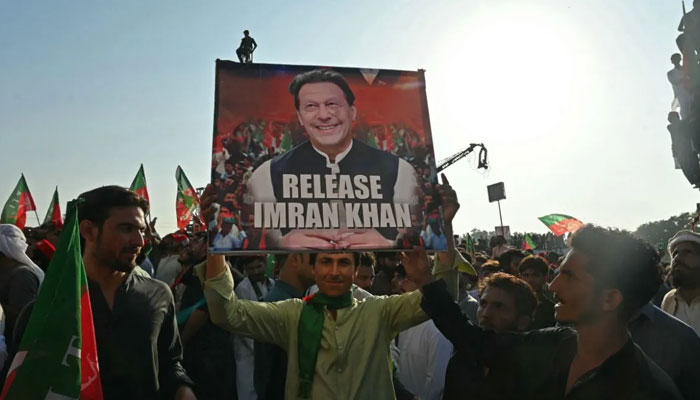Damaging politics
As Pakistan prepares to host the Shanghai Cooperation Organisation (SCO) summit in Islamabad, a significant international event that underscores the country’s strategic importance in the region, the PTI has decided it would rather be petulant than responsible and has announced yet another protest at D-Chowk, scheduled for October 15. The timing of this protest, coinciding with the arrival of foreign dignitaries from multiple countries, naturally raises questions about the PTI’s motives and its willingness to endanger Pakistan’s international standing for political gain. The move has been condemned across the board by other parties, a rare consensus across political lines that highlights the seriousness of the situation, as Pakistan’s leadership recognises the need for stability during such a critical diplomatic moment. What makes the PTI’s decision even more troubling is the backdrop of improving economic conditions in the country. After years of economic turmoil, Pakistan has finally started to see signs of recovery. The IMF programme is back on track, inflation has fallen to below seven per cent, interest rates are dropping, and both exports and remittances have risen. The stock market is breaking records, and foreign exchange reserves have crossed the $10 billion mark. In this context, many observers are questioning why the PTI would choose this particular moment to stage a disruptive protest. The answer, according to political analysts, lies in the party’s fear of losing relevance. As economic stability begins to take hold, there is a growing sense that the ruling government will be less vulnerable to pressure, both politically and economically. If the current trend continues, economic growth could soon follow, further consolidating the government’s position.
Whatever the reasons, this approach reflects poorly on the PTI’s priorities. Instead of contributing to the national interest or engaging in constructive dialogue, the party seems determined to plunge the country into turmoil for the sake of its political ambitions. A protest that risks turning Islamabad into a battleground during an international summit is not only irresponsible but also dangerous. The optics of such a move – where foreign dignitaries arrive in a city marred by clashes and lockdowns – could severely damage Pakistan’s image on the world stage and undermine the very stability that is crucial for long-term economic growth. Even within the PTI, there appears to be some dissent over the timing of the protest – some of its leaders having expressed opposition to holding the demonstration during the SCO summit and emphasising the importance of avoiding protests that could jeopardise national security at such a critical time. This also highlights the growing divide within the PTI between those who advocate for responsible politics and those who seem intent on confrontation at any cost.
In a time of economic recovery, national unity is paramount. Unfortunately, the PTI seems focused on exploiting any opportunity to weaken the government, even if it means undermining the country’s international standing. The timing of this protest, during an event that could significantly boost Pakistan’s diplomatic and economic ties, is not just unfortunate – it is reckless. As Pakistan hosts the SCO summit, the nation should be projecting an image of stability, cooperation, and growth. Instead of protests and chaos, there should be a focus on fostering unity and demonstrating that Pakistan is ready to play its role on the global stage. The PTI’s actions, however, threaten to derail this progress and create a cycle of political and economic instability. It is time for the PTI to put the national interest above party politics and recognise that Pakistan’s future depends on collective responsibility, not divisive protests.
-
 Caleb McLaughlin Shares His Resume For This Major Role
Caleb McLaughlin Shares His Resume For This Major Role -
 King Charles Carries With ‘dignity’ As Andrew Lets Down
King Charles Carries With ‘dignity’ As Andrew Lets Down -
 Brooklyn Beckham Covers Up More Tattoos Linked To His Family Amid Rift
Brooklyn Beckham Covers Up More Tattoos Linked To His Family Amid Rift -
 Shamed Andrew Agreed To ‘go Quietly’ If King Protects Daughters
Shamed Andrew Agreed To ‘go Quietly’ If King Protects Daughters -
 Candace Cameron Bure Says She’s Supporting Lori Loughlin After Separation From Mossimo Giannulli
Candace Cameron Bure Says She’s Supporting Lori Loughlin After Separation From Mossimo Giannulli -
 Princess Beatrice, Eugenie Are ‘not Innocent’ In Epstein Drama
Princess Beatrice, Eugenie Are ‘not Innocent’ In Epstein Drama -
 Reese Witherspoon Goes 'boss' Mode On 'Legally Blonde' Prequel
Reese Witherspoon Goes 'boss' Mode On 'Legally Blonde' Prequel -
 Chris Hemsworth And Elsa Pataky Open Up About Raising Their Three Children In Australia
Chris Hemsworth And Elsa Pataky Open Up About Raising Their Three Children In Australia -
 Record Set Straight On King Charles’ Reason For Financially Supporting Andrew And Not Harry
Record Set Straight On King Charles’ Reason For Financially Supporting Andrew And Not Harry -
 Michael Douglas Breaks Silence On Jack Nicholson's Constant Teasing
Michael Douglas Breaks Silence On Jack Nicholson's Constant Teasing -
 How Prince Edward Was ‘bullied’ By Brother Andrew Mountbatten Windsor
How Prince Edward Was ‘bullied’ By Brother Andrew Mountbatten Windsor -
 'Kryptonite' Singer Brad Arnold Loses Battle With Cancer
'Kryptonite' Singer Brad Arnold Loses Battle With Cancer -
 Gabourey Sidibe Gets Candid About Balancing Motherhood And Career
Gabourey Sidibe Gets Candid About Balancing Motherhood And Career -
 Katherine Schwarzenegger Shares Sweet Detail From Early Romance Days With Chris Pratt
Katherine Schwarzenegger Shares Sweet Detail From Early Romance Days With Chris Pratt -
 Jennifer Hudson Gets Candid About Kelly Clarkson Calling It Day From Her Show
Jennifer Hudson Gets Candid About Kelly Clarkson Calling It Day From Her Show -
 Princess Diana, Sarah Ferguson Intense Rivalry Laid Bare
Princess Diana, Sarah Ferguson Intense Rivalry Laid Bare




